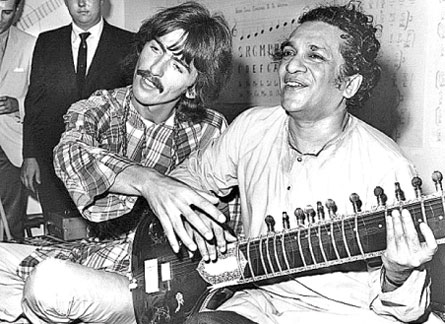Man who played music for humanitarian aid
By Amal Hewavissenti
Pandit Ravi Chaudhuri Shankar, a musician and an internationally
acclaimed sitarist silenced the melodious vibrations on his sitar on
December 11 last year. Announcing the sad departure of this celebrated
sitarist, the Indian government said that India had lost a national
treasure - catalyst to have introduced classical Indian music to the
western world.
He was the oriental musician who played musical dialogues with George
Harrison, the guitarist of the Beatles. Offering comments on Shankar's
autobiography Ragamala, Oliver Craskett states that he is probably the
best sitarist and is among the few pre-eminent classical musicians that
India has ever produced.
 |
|
George Harrison with
Ravi Shankar |
Being an impressive instrumentalist on the stage, a musician, a
composer and a teacher, he made every possible effort to disseminate
Indian classical music and culture throughout the world. His encounter
with George Harrison was definitely a turning point in his mission to
popularise classical music in the west. This was a worthwhile move
particularly at a time when the international music arena had been
chiefly influenced by western music.
Ravi Shankar succeeded in mesmerising his audience with what he
played on his sitar - melodies that reflected superb combinations of
notes of North Indian Raga System. His rapport with George Harrison
brought out certain transformations in the music played on the
conventional standard of the Beatles.
Following a momentous encounter with Ravi Shankar, George Harrison
the guitarist of Beatles arrived in Sri Nagar India and studied Sitar
under him. George Harrison (who later edited Shankar's autobiography
Ragamala) studied sitar for six weeks under Ravi Shankar's guidance and
offered a great deal of support for Shankar's relentless endeavour to
popularise Indian music in the West.
It is interesting to note that Ravi Shankar deeply aspired to impress
the pleasant depth of classical music in the minds of the music fans in
the west. Ravi Shankar's musical rapport with George Harrison was so
stable that Harrison included sitar instrumentals in three albums by
Beatles.
The popular hit Love You Too in the album Revolver featured sitar
interludes for the first time and western fans developed an "ear" for
sitar segments in music.
He exploited his talent in music to collect funds for humanitarian
aid for millions of displaced people in the world in the wake of war.
For instance, he was deeply moved by the plight of thousands of
displaced people who fled to India during the war in Eastern Pakistan.
He immediately arranged musical shows with George Harrison and collected
funds to support the orphans. Subsequent on this humanitarian move, he
played his sitar live on stage to collect funds to aid the Ethiopians
struck by the widespread famine.
Furthermore, Ravi Shankar performed musical shows to raise funds to
rebuild Haiti that was destroyed to a larger degree by an earthquake in
2010.
Ravi Chaudhuri Shankar's childhood was spent in poverty and his life
in Varanasin filled his mind with bitter memories.
When he turned 10 he joined a dancing ensemble and migrated to France
with his elder brother who was in charge of the team.
From then on Ravi Shankar travelled throughout Europe for
performances of dancing with his brother. Here he was dedicated to
disseminating Indian classical and folk dances in Europe.
At the age of 18, Shankar permanently departed from Ude's dancing
ensemble that was by then one of the world's best. By this time, he had
developed a passion for sitar and studied sitar under Alavdeen Khan who
was a veteran musician.
At the end of six years of Sitar study, Shankar channelled his
capacities into composing theme music for cinema. Ravi Shankar became
the music director for Indian Broadcasting Corporation from 1949 to
1956.
The theme music for Sathyajith Ray's Apoor Sansar, Pathar Panchali
and Parajitho are Shankar's masterpieces in film music. By the 1990s,
Ravi Shankar staged about 30 live performances throughout the world each
year in spite of increasing frailty.
He was the first to stage live shows of classical sitar music in
Europe, North America, Japan and Russia.
Considering his great service and dedication to music the Indian
government and several institutions honoured him with several awards.
Thus, he was awarded the title of Padmavibhushan, Kalidas and Bharatha
Rathna which is the highest title an Indian could ever have. His frail
health and excessive stress caused by repeated foreign tours and live
performances expedited his death. Yet, suppressing the conditions caused
by ill health, Ravi Shankar concentrated more on the performance at Long
Beach - California on December 7 2012. This was his last performance.
This great musician was subjected to a serious heart surgery in 2011
but his ill health continued to plague him till his death. After the
surgery Shankar suffered from difficulty in breathing but he put on more
weight on his live performances in different countries. In whatever way,
Ravi Shankar is a great genius in music who seemed to have believed that
preserving a certain form of art unique to a country is inadequate
unless it is introduced to other countries.
|

